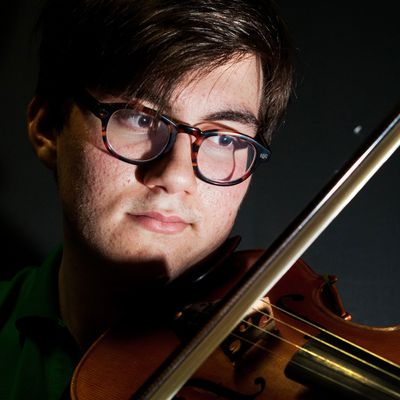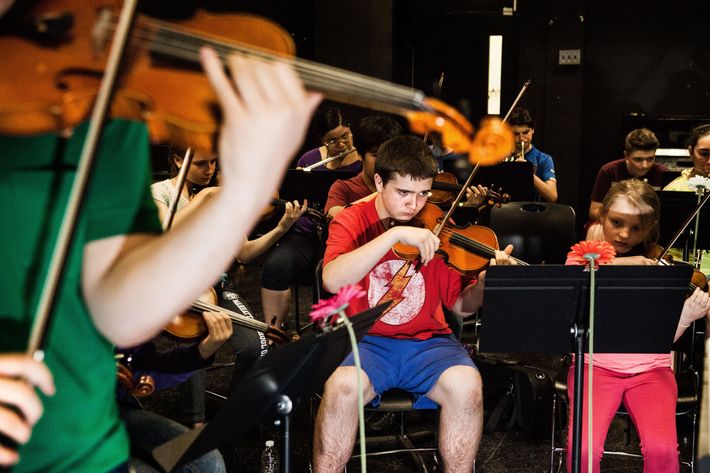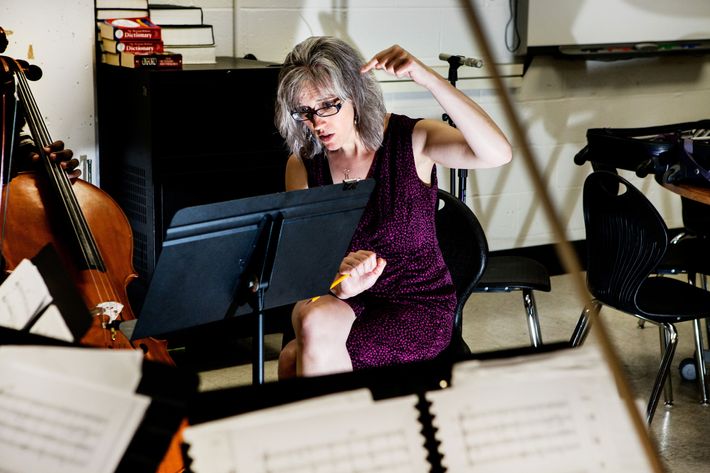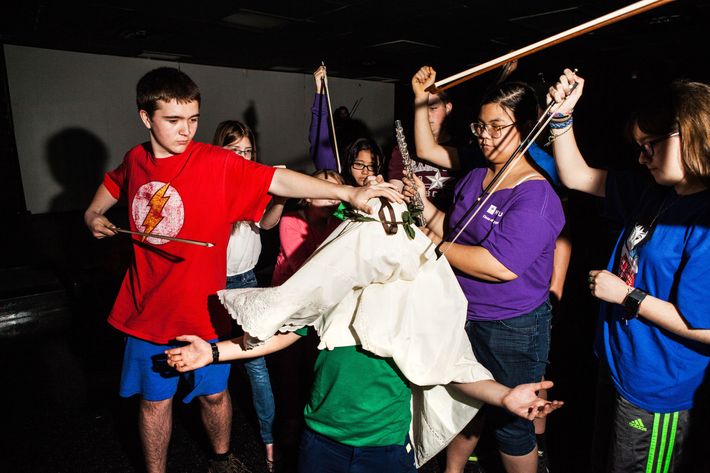
On a Friday afternoon in April, 14-year-old Paris Lavidis was rehearsing his string quartet before their debut at BAMCafé. They were readying Paris’s mind-warping composition, “and what do you think of my Buddha?” — which is set in the decidedly adult and druggy atmosphere of mid-century San Francisco — only they were using a modified, parent-friendly version.
At the premiere two weeks prior, at the Kaufman Music Center, the grown-ups had shot down some of Paris’s most rascally ideas: using firecrackers as percussion, smoking a hookah onstage. So he’d improvised, substituting a whip for the fireworks and handing out kazoos instead of pipes. But the compromise had stolen some of his thunder.
Though the piece sounds chaotic, it’s layered with references to Bartók, Tchaikovsky, and Ravel, and it had taken the quartet several weeks of grueling work to synch up their parts. Half the music is written in meter, and the other half uses spatial notation, meaning the timing is up to the player. (Sample tempo marking: “Mezzo piano; dejected, but needing to get in the last word.”) Paris, who also plays first violin, insisted that certain sections had to collide with the precision of a Rube Goldberg machine. When they came to the final sequence, about seven minutes in, Gabbo Lewis, the second violinist, cued up the soundtrack to 2001: A Space Odyssey. In the iconic opening of Richard Strauss’s “Thus Spake Zarathustra,” the first triumphant chord was the cue for Camille Dietrich, their cellist, to bang a gong. Then Gabbo was supposed to switch the turntable to chipmunk speed and warp the sound by shaking the LP. But when he turned the record on, at first there was silence, then cellos sounding a low, ominous chord — he’d set the needle in the wrong groove, nearly a minute too far in.
Camille hurled down her mallets and flipped Gabbo off with both hands.
Paris, though, burst out laughing. They’d found the perfect dénouement.
“Do that in the performance,” he told Camille.
Paris and the quartet perform under the banner of Face the Music, a collective with 220 kids ranging from ages 8 to 18. It comprises two symphonies, several chamber groups, and some ensembles that come together ad-hoc for specific concerts. Though it’s based at Kaufman’s Special Music School, P.S. 859, on the Upper West Side, it brings together students from public and private schools all over the city — on an audition basis, with low tuition fees and scholarships when necessary.
But unlike the familiar image of young musicians soullessly sawing away at Bach concertos, most of what kids in Face the Music play is experimental, and much of it is outright bizarre. In fact, there’s only one rule: They only perform work by living composers. The result is a subculture where Radiohead and Portishead cross-pollinate with Bartók and Dvořák, where orchestral music feels newly relevant as a medium of self-expression.
In most high schools, the ability to play clarinet at a nearly virtuosic level or articulate finer points of musical theory or transcribe Brahms’s sonatas from memory can put kids on the social margins. Classical music is regarded as academic, whereas hip-hop and garage rock are vehicles for creativity. But, the Face the Music argument goes, it doesn’t need to be that way. Classical skills can open up artistic possibilities without closing off ideas from other genres. And Paris — likely the program’s most prolific composer, definitively part of its creative vanguard — with his incredible stylistic range, his blend of intellectualism and juvenile spontaneity, and, especially, the way he works with his peers, drawing off their ideas, pushing them in new directions — is a key to understanding how this small renaissance is happening.

Like many of Paris’s compositions, “and what do you think of my Buddha?” was written by request for a specific show: in this case, the Kaufman center’s Ecstatic Music Festival, curated by the composer Judd Greenstein. In March, the festival was staging a tribute to the minimalist composer Terry Riley for his 80th birthday. Paris recalls starting with a question: “‘What’s a nonmusical way I can connect to Riley?’ Because I kind of foresaw that everything on the program was going to sound like Riley.” And it’s too easy, he says, to just ape another composer’s style.
On a flight home from a family vacation, Paris had just read The Electric Kool-Aid Acid Test, Tom Wolfe’s 1968 account of the LSD subculture. The wacky prose made him feel like he was tripping — or his best guess as to what tripping is like. He decided his tribute should evoke the atmosphere of Berkeley in the 1950s, when Riley had studied composition there. So he wrote from that same imaginative place where the book had taken him.
As it happens, he says he’s never smoked pot — though he proposed that the quartet take LSD after the first performance, a suggestion the director nixed.
Not surprisingly, Paris’s parents watch their son’s creative activities with a mixture of humor and gentle concern. His mother, Krysanne, is an entertainment lawyer who produces films, and his father, Achilles, is an architect and actor. They live in a three-bedroom apartment in Chelsea, where the living-room wall beside the piano has been converted to a chalkboard on which Paris sketches out composition ideas. When I visited, it was full of mathematical graphs, as he’s been converting algebraic functions into polyrhythms.
Since kindergarten, he has attended St. Ann’s in Brooklyn Heights, a private school for gifted students, where tuition runs some $39,000 a year. There are no grades or standardized tests, and the students largely design their own curricula. During his summer and winter breaks, the family vacations in Greece, where their relatives live, or Australia, where his parents grew up — despite Paris’s occasional protests that he needs to stay home and work.
All this is to say that he’s at an intersection of rare privilege and equally rare self-motivation. He’s lucky to be in environments where he can virtually do whatever he wants. If anything, his parents try to rein in his ambition, wanting him to have a more normal childhood: a little more hanging out with friends, a little less working out string parts. Achilles sometimes worries that the quartet rehearses too much — 12 to 15 hours a week on average, on the kids’ own initiative, besides individual practice time.
In conversation, Paris can seem not just precociously clever but truly intellectually mature, particularly when he explains his philosophy of composition. Describing to me a pitfall he’s noticed in modern music, he complained about a piece the Kronos Quartet recently performed at Carnegie Hall, which was ostensibly a meditation on climate change. The problem, Paris said, is that the music’s tonal language didn’t relate to climate in any meaningful way. He thought it was “masturbatory.” As a counterexample, he cited his project with algebraic functions, which is supposed to make a mathematical idea come to life through musical patterns. The key difference, he explained, is that in his own piece, the music and the abstract idea are fully integrated.
But just when he starts sounding self-serious, he’ll revert to talking like a middle-schooler. When I asked about his classes, he brought up his most recent art project: “I just did a piece the other day with a mechanical fish inside a pizza box, wound up with twine, with hair gel. It was intense. So there was that.”
Paris’s musical training began early. He started asking his parents for violin lessons at age 3, pestering them for a year before they concluded he was serious and found him a teacher. In an arrangement that now seems providential, he ended up studying the instrument under Brian Krinke, whose wife, the brilliant Jenny Undercofler, would become Face the Music’s founder and director.
The Beatles were Paris’s first love. His parents remember him watching the Yellow Submarine movie every day until he discovered A Hard Day’s Night. At his evaluation to get into kindergarten at St. Ann’s, he told the interviewer his name was John, after John Lennon. Later he warmed up to symphonic music he played in youth orchestras, such as Mozart’s “Requiem.” Discovering Stravinsky at age 9 precipitated his plunge into late-20th-century music. Other than “Requiem,” he never found much emotional resonance in Romantic music, and even less in the lush Baroque works of Bach and Handel.
It doesn’t take long to detect Paris’s deep-seated contrarianism. He doesn’t want to break rules so much as overturn them. So it’s not hard to understand why something like Stravinsky’s Rite of Spring, which provoked rioting at its debut a century ago, inspired him from early on. Around third grade, when he started experimenting with composition software on his MacBook, what he calls his “antinomian” tendency — and I’d call transgressiveness — was already at play: He was incorporating dissonance and unconventional structures.
But plunking out songs on the computer, alone in his bedroom, wasn’t much of an outlet, and occasional violin recitals weren’t enough either. He needed a community. He needed some composer friends.

Meanwhile, on the Upper West Side, Face the Music was taking shape via Jenny Undercofler’s own process of trial and error.
During the early 2000s, after she had finished her Ph.D. at Eastman School of Music in Rochester, Undercofler taught an ear-training program at Juilliard’s pre-college. It brought many of New York’s most advanced young musicians together in a single room — an experience she found thrilling but also frustrating. The kids were so excited for their time together, meeting just once a week wasn’t nearly enough. So when the Special Music School offered her a job directing its music program in 2004, she seized the a chance to broaden her impact.
In her second school year, she started an after-school ensemble by going classroom to classroom, recruiting kids who wanted to try out alt-classical repertoire. Only eight signed up.
In the early months, they met for just an hour a week and rehearsed at an easy pace. The following year, another four students joined. Finally, in 2008, she gave them a demanding piece: “Yo Shakespeare” by Michael Gordon, a post-minimalist composer who grew up in Nicaragua. It layers flute, saxophones, and violins with electric guitar and synth drones for a texture evocative of jungle music. The musicians seem to be playing three different songs, based on individual dance rhythms but united by a common groove. It inspired the kids to rehearse with a newfound focus. Their performance in the Wordless Music series at Good Shepherd Faith Church went off perfectly.
It gave Undercofler a revelation: The key was to pick what she calls “crunchy” repertoire, not the mellow minimalism of, say, Philip Glass. The kids thrived on music that was chromatic and rhythmically dense, the kind her own generation had turned away from. “I think it speaks to them for the same reason that heavy metal speaks to them,” she told me. “Kids at that age are very attuned to the honesty of the emotions. So if it’s kind of extreme, that’s a good thing.”
In 2011, for his teacher’s studio recital, Paris performed Vincent Persichetti’s “Masques,” a series of piano-violin duets vaguely reminiscent of Bartók, full of stark rhythm changes. Afterward, Undercofler, who was there with her husband, approached him and asked if he’d like to join Face the Music. By both of their accounts, she was just “casting a wide net,” recruiting without much discrimination. They didn’t anticipate how perfect the match would be. For one of his early seasons, they performed the piece that became their second milestone: “Artificial Life,” by the Columbia professor George Lewis. Instead of standard notation, it consists of a four-square grid with verbal instructions, such as “smooth,” “interrupt,” and “end.” The musicians are supposed to improvise their way through, pausing for interludes of silence.
Undercofler worried it would degenerate into self-indulgent squawking rather than a musical conversation. But she was surprised at how the students listened to one another. It had just the right balance of structure and freedom. “Once they internalized the rules,” she recalled, “it seemed like all these ideas started coming out.”
During a performance at Queens College in April 2013, when they came to the “Interrupt” section, Paris spontaneously opened his mouth and uttered a loud, howling groan. The timing was perfect; Undercofler remembers audience members falling out of their chairs laughing. Paris had found his musical home.
This is when his artistic development accelerated. The same year, Undercofler hired a full-time composition teacher, Robinson McClellan, and Paris enrolled in the inaugural ComposerCraft class. There he met a seventh-grader, Zachary Detrick, who already had a couple years’ worth of composition lessons under his belt. They bonded over their love of Stravinsky. McLellan says Paris was always starting rows with traditional-minded students by denouncing Vivaldi.
During a summer break, Zachary recruited Paris and another friend, Abe Gold, to help him compose an avant-garde opera. Zachary wanted to channel all his frustration over middle school: the social exclusivity, the cutthroat competitiveness among other piano students. The heart of the composition, he told me, was to be an “idea of chaos.”
Together the boys drew up “musical diagrams, specifying the tempo and time structure of each movement, then each of them composed parts for four instruments, not knowing how it would jibe. The product, despite its high concept, is something only middle-school boys could produce. For the text, they transcribed random news reports from the radio, borrowed from William Carlos Williams and e.e. cummings, and wrote in sections for improvisation (one instruction reads “Improvised Chaos — Recite Nonsense Poetry Loudly Until the End”). The instrumentation includes a drill and an ice-crusher. It’s never been performed, but a piece from Scene 10 made its way into a composition Zachary wrote for the New York Philharmonic.
With this opera in mind, it doesn’t seem so counterintuitive that teenagers would be playing avant-garde music. On the contrary, they might be its most obvious demographic. There’s a silliness in experiments like John Cage’s “Imaginary Landscape No. 4,” where the musicians simply turn radios to different frequencies, or Jacob TV’s “Heartbreakers,” which overlays Jerry Springer sound clips with a saxophone quartet, and middle-schoolers are especially poised to notice it. What’s clear is that the boys’ opera collaboration opened new creative avenues for all three of them.
Since then, Paris has had 22 of his compositions performed, between Face the Music and professional groups he’s connected with via the program. Undercofler has a separate folder in her email inbox just for his ideas. His parents tell me he composes when he gets home from rehearsal in the evenings, or late at night after he finishes his homework, as a way of unwinding: the periods when a lot of kids would watch TV.
This kind of creative impulse can’t be taught, but it took the social environment of Face the Music to trigger it. Paris finds gratification in showing his new pieces to friends and in working them out in rehearsals. McClellan says his students learn more, in aggregate, from one another than they learn from his own instruction.
“I feel like in a lot of schools these young composers would be, like, the one kid who was the classical-music nerd,” he told me. “But here, they’re all classical-music nerds. And I mean that word in the best possible way. It’s the thing to be.”

On June 14, Face the Music concluded its major spring concert with Paris’s most high-minded composition to date: his “Concerto in D” (a title nodding to the Tchaikovsky piece that gave Paris an inspirational spark). Though it’s an oblique tribute to his experience in the collective, it may also be the darkest piece ever performed by a youth orchestra, as attested by the silent emptying afterward of the Kaufman Music Center’s auditorium.
In the first movement, Paris stood in front of the Philharmonic, wearing a gaudy beige jacket that came almost down to his knees. On his violin, he played a beautiful, melodic theme that could have come from the 1870s. Then, for the second movement, he improvised a solo. A spotlight shone on him, and as he played other musicians set their instruments down, one by one, and came to drape him with ornaments: gold ribbons, jewelry, a wreath. The music became more dissonant until he was making his instrument screech. The concert mistress laid flowers at his feet, before he dramatically collapsed under the weight of the adornments.
The lights onstage turned to a red glow, and an organ entered with an ominous drone. The concert mistress wrenched Paris’s violin from him and played a discordant melody. Finally, the other musicians covered him with a black sheet, raised their bows, and thrust them at his sides like daggers. As the lights went out, his body made a thump on the stage.
When we had discussed it before the concert, I asked whether the piece had an autobiographical element — a signal that he feels too much pressure being held up as a prodigy. But he seemed surprised at the suggestion. Instead, he sees “Concerto in D” as an attack on traditional youth music programs, where students don’t have the freedom he does.
“The idea is, there’s a new prodigy every year,” he said. “Or even every month.” Virtuosos are replaceable; the machine of conventionalism just uses them as its fuel. They’re hailed, but only, Paris offers, as the “puppets of a ubiquitous, inevitable tradition.” And it breeds a nasty spirit of competitiveness among their peers.
Face the Music is different. Because of its horizontal structure, its lack of a hierarchy, it simply isn’t competitive. And this, finally, is what accounts for its apparent success, the reason its members have managed to breathe life into an old art form: because of the collective support, the free exchange of ideas, the way kids even gain social capital from composing. And because with avant-garde repertoire, there are no rules; they can do whatever they want.
Or at least that’s why it’s worked for Paris. “People don’t ignore their teachers enough,” he mused to me. “This is a big thing that I tell people. They’re struggling with, like, being perfect, and I’m like, ‘Have you ignored your teacher recently?’ And they’re like, ‘Why would I ignore my teacher?’ And I’m like, ‘Yeah, okay, I knew it. You’re fucked up.’”




